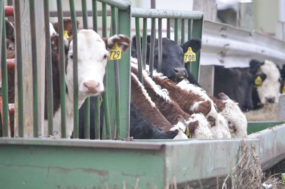Temperatures across the state were in the mid-90s to the lower 100s Tuesday, and high humidity drove heat indices to between 105 and 115, according to the National Weather Service.
Oedekoven said the biggest problem for cattle has been that there's been no reprieve in the evenings.
``Typically during hot weather, at least it cools off in the evening and cattle can kind of cool off and dissipate that heat that they've built up during the daytime,'' Oedekoven said.
An excessive heat warning issued by the weather service for most of the state remains in effect until 7 p.m. Wednesday.
``As long as these conditions persist, we're probably going to lose some more cattle,'' said Ben Holland, an extension beef feedlot specialist.
Holland said steps should be taken to allow cattle to adequately dissipate heat. Shade helps, but it's most effective when air can move through the shaded area.
When nighttime low temperatures remain above 70 degrees, especially for extended periods of time as they have this week, cattle cannot shed the body heat they built up during the day, he said.
Ranchers can help cattle cool off at night by sprinkling mounds in dirt pens late in the evening or at night.
``If you can cool that off with some water, that gives them a place to lie down and allows that heat to leave the animal,'' Holland said.
Several hundred head of cattle at a feedlot near Estelline have died due to the extreme heat and humidity.
Estelline Assistant Fire Chief Jeff Nystrom told KWAT radio that the department has been called to help cool cattle at a few area feedlots, and crews were headed out to spray down more cattle Tuesday.
That can be effective if the animals are used to being sprayed, but it can also cause added stress, Oedekoven said.
``If they're not used to misting and you turn sprinklers on over top of them, you can sure stress them out and raise their respiratory rate,'' he said. ``At this point, you want to keep them calm. You want to avoid working them unless it's early in the morning.''
Holland said if ranchers do spray, they should use a droplet size, which is big and will get the cattle wet without really increasing the relative humidity too much.
Oedekoven said other tips include moving feedings to later in the evening because animals produce a lot of heat during digestion and providing plenty of water, preferably at a temperature of less than 80 degrees.
``The cattle will drink more if it's cooler water,'' he said. 







